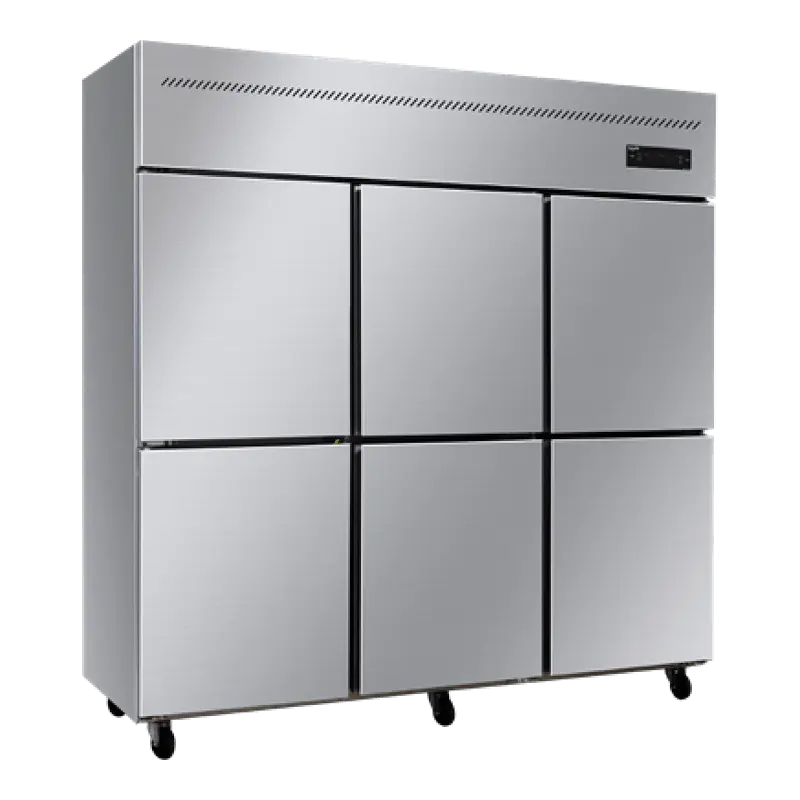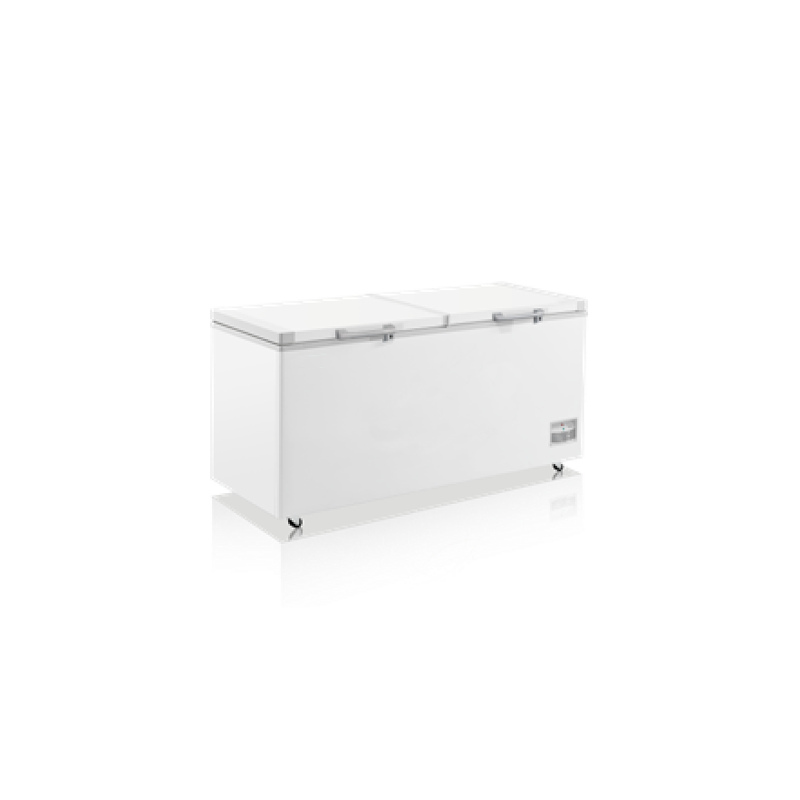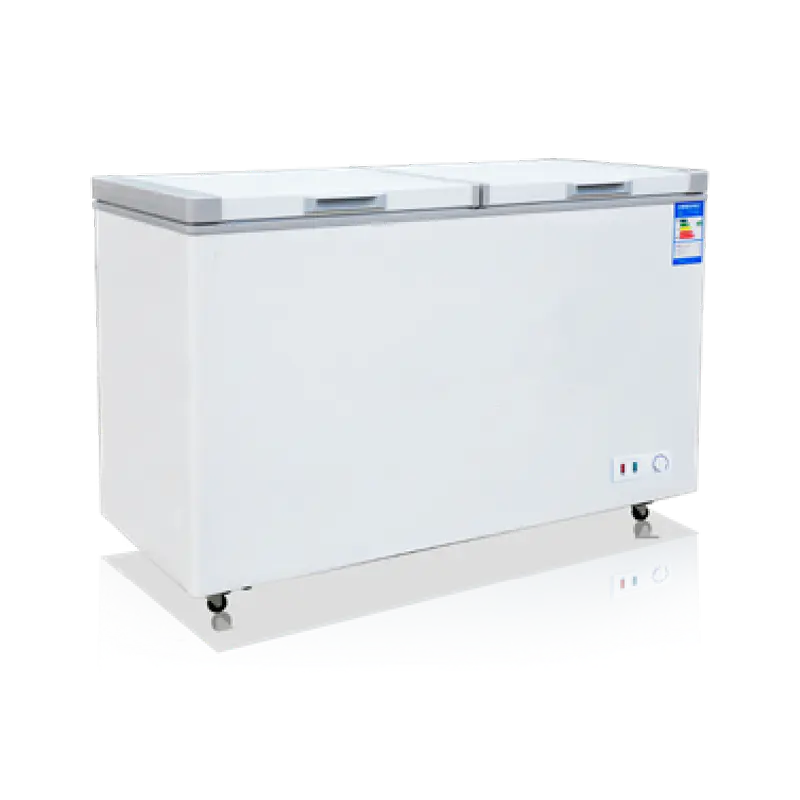How Loud is a Commercial Chest Freezer During Operation?
Typical Noise Level Range for Commercial Chest Freezers
Most commercial chest freezers fall into a practical operating band of about 45–75 dB(A) depending on size, compressor design, condenser airflow, and installation conditions.
In manufacturer literature, you’ll often see many chest-style units clustered in the ~40–50 dB(A) range, while more demanding refrigeration (for example, some ultra-low temperature systems) can land in the mid-to-high 50s dB or higher.
If your unit is installed in a quiet customer-facing area (small café, front-of-house retail), you’ll notice the same dB(A) rating more than you would in a prep room with constant ambient noise.
| Measured sound at ~1 m | What it often sounds like | Most common driver |
|---|---|---|
| 40–50 dB(A) | Low hum; easy to ignore | Compressor on-cycle, light airflow |
| 50–60 dB(A) | Noticeable in quiet rooms | Condenser fan + compressor together |
| 60–75 dB(A) | “Loud appliance” territory | High airflow, vibration, worn fan/mounts, poor placement |
Why the Noise Comes and Goes During Operation
Chest freezers are not loud continuously. The perceived noise usually changes with the refrigeration cycle:
- Compressor start-up: a brief rise in hum or “kick” as the compressor engages.
- Steady run: a stable hum; airflow noise if a condenser fan is running.
- Shut-off: the sound drops quickly; occasional refrigerant “gurgle” can occur as pressures equalize.
If you only measure noise when the compressor is off, you may underestimate how loud the unit is “in real life.” For meaningful comparisons, measure during the compressor on-cycle.
How to Measure a Commercial Chest Freezer’s Loudness Correctly
To match how many vendors communicate noise, aim for dB(A) (A-weighted decibels) and a consistent distance such as 1 meter. Some suppliers describe a 1 m, no-load, compressor-running approach for spot checks against a declared maximum.
Simple field method (practical, repeatable)
- Use a phone app as a rough indicator, or a handheld meter for better repeatability; set it to dB(A).
- Stand 1 m from the freezer’s noisiest side (often near the compressor/condenser area).
- Measure once with the compressor clearly running for 20–30 seconds and note the average.
- Measure “room-only” background noise with the freezer temporarily off (or between cycles) and record that too.
What to write down so the number is actionable
- Distance (e.g., 1 m) and where you stood (front, compressor side, corner).
- Whether the compressor and/or condenser fan was running.
- Installation notes: touching a wall, on tile vs. rubber mat, level vs. rocking.
For engineering-grade sound power measurements, laboratories may use standardized methods such as ISO 3744 (sound power derived from sound pressure measurements around the source), but most buyers and operators only need consistent dB(A) spot checks for comparison and troubleshooting.
What “Normal” Sounds Like vs. What Signals a Problem
Loudness alone doesn’t always indicate failure. The more useful diagnostic is the type of sound and whether it changed suddenly.
| Sound | Often normal? | Typical cause | What to do |
|---|---|---|---|
| Steady low hum | Yes | Compressor running | Check spec dB(A); confirm unit is level |
| Rattling / buzzing | Sometimes | Vibration against floor/wall, loose panels | Isolate, tighten fasteners, add pads |
| High-pitched whine | Less often | Fan motor, blade rub, airflow restriction | Clean condenser path; inspect fan |
| Clicking every few seconds | No | Start relay cycling / overload | Service call; avoid repeated starts |
A useful rule of thumb: if the freezer’s dB(A) reading jumped noticeably after a move, cleaning, or heavy restock, the cause is often installation or airflow rather than a sudden compressor defect.
Practical Ways to Make a Commercial Chest Freezer Quieter
Noise reduction is usually about controlling vibration, improving airflow, and eliminating contact points that turn small vibrations into loud rattles.
Installation and vibration control
- Level the unit so it does not rock; rocking amplifies compressor vibration.
- Add rubber isolation pads under feet/casters (especially on tile or thin metal platforms).
- Ensure the freezer is not touching walls, shelving uprights, or drain lines that can rattle.
Airflow and cleaning (often the biggest win)
- Keep condenser areas clear; blocked airflow can increase fan noise and run time.
- Clean dust/grease from vents and condenser surfaces on a predictable schedule (kitchens accumulate film quickly).
- Maintain clearance around the unit per manufacturer guidance; tight alcoves can reflect and magnify sound.
Component-level fixes (when noise is abnormal)
- Replace worn fan blades or fan motors if you hear scraping, ticking, or persistent whining.
- Tighten loose panels and brackets; thin metal covers can act like a speaker cone when the compressor runs.
- If you hear repeated start-clicking, prioritize service: repeated starts can be hard on electrical components.
How to Shop for a Quieter Commercial Chest Freezer
If quiet operation is a buying requirement, treat noise as a spec, not a guess. Many commercial suppliers publish dB(A) figures for product lines, and some indicate product families topping out around the mid-50s dB(A) in their ranges.
What to ask for (and how to compare)
- The stated noise level in dB(A) and the measurement distance (commonly 1 m).
- Whether the unit uses a condenser fan and how aggressive the airflow strategy is (airflow can add noticeable high-frequency noise).
- Whether the application is “front-of-house” (quiet priority) or “back-of-house” (durability/heat rejection priority).
As a practical benchmark, if a unit is truly intended for quiet placement, you should expect published figures closer to the 40s to low-50s dB(A) rather than the upper end of typical commercial ranges.
Quick Checklist: Diagnose and Reduce Noise in 10 Minutes
- Confirm the sound happens during compressor on-cycle (not just random room noise).
- Push gently on panels; if the noise changes, you likely have a vibration/rattle issue.
- Verify the freezer is level and not rocking; adjust feet/casters if needed.
- Pull it slightly away from walls and remove contact points (cords, pipes, shelving).
- Check airflow pathways and clean dust/grease buildup around condenser areas.
- Re-measure at 1 m in dB(A) and record the new value; aim for a stable reading and fewer rattles.
If the freezer remains in the 60–75 dB(A) range after leveling, isolation, and cleaning, the next most likely culprits are fan wear, loose mounting hardware, or an installation environment that reflects and amplifies noise.


 English
English русский
русский Español
Español عربى
عربى













